1/n
#Frailty is the MAIN #Covid19 risk
Swedish per capita excess mortality over 70 is almost EXCLUSIVELY in nursing homes ("särskilt boende") and home care ("hemtjänst").
Almost NO excess in no care ("ej").
@LTCcovid @MBattegay
socialstyrelsen.se/globalassets/1…

#Frailty is the MAIN #Covid19 risk
Swedish per capita excess mortality over 70 is almost EXCLUSIVELY in nursing homes ("särskilt boende") and home care ("hemtjänst").
Almost NO excess in no care ("ej").
@LTCcovid @MBattegay
socialstyrelsen.se/globalassets/1…
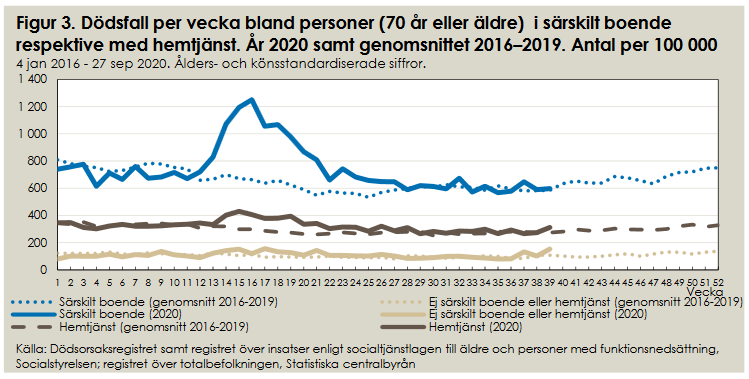
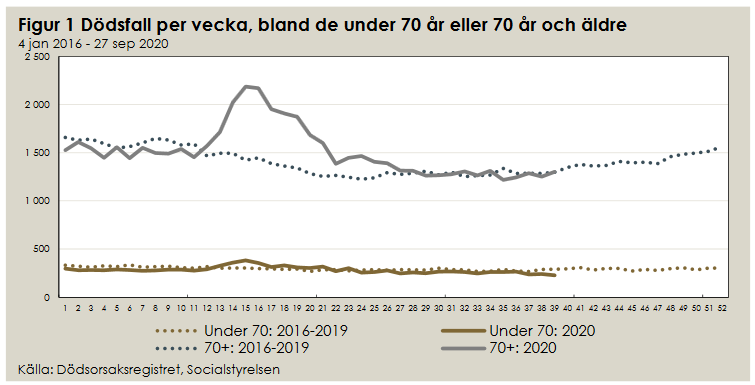
2/n
baseline of previous years shows
1. per capita mortality risk is always much higher in elderly care settings. that means life expectancy is much shorter.
2. always MILD seasonality in deaths of all causes +/- 12.5%.
this year is different... cont.
baseline of previous years shows
1. per capita mortality risk is always much higher in elderly care settings. that means life expectancy is much shorter.
2. always MILD seasonality in deaths of all causes +/- 12.5%.
this year is different... cont.
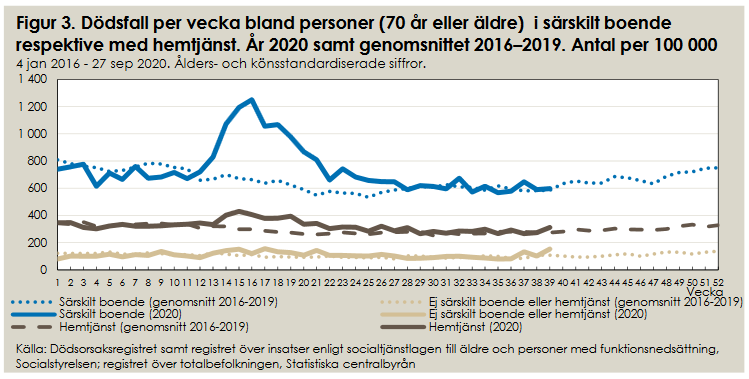
3/n
Peak excess mortality in Sweden during 1st wave this year +~100% in nursing homes,
+~33% in at home elderly care.
maybe briefly in some weeks ~+25% in no care in 70+ years, this one is difficult to estimate from chart due to low baseline number.
Peak excess mortality in Sweden during 1st wave this year +~100% in nursing homes,
+~33% in at home elderly care.
maybe briefly in some weeks ~+25% in no care in 70+ years, this one is difficult to estimate from chart due to low baseline number.
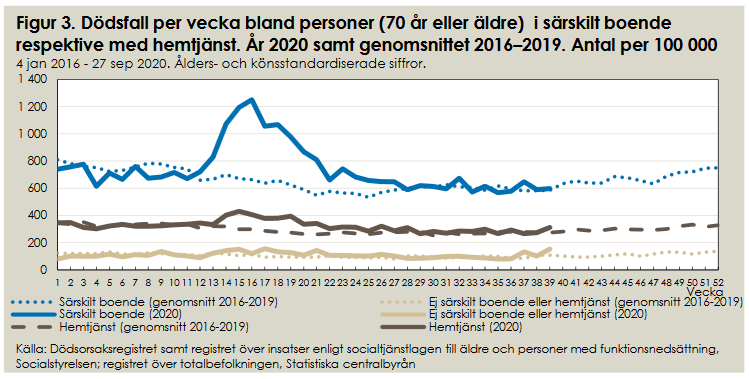
4/n mortality data is for 1st wave
But: correlation between deaths ("avlidna") inside nursing homes ("äldereboende") vs outside ("ej") is incredibly stable in 2nd wave, too
NH bed capacity is just 1.3% of Swedish population, Covid19 death share is 50%
folkhalsomyndigheten.se/globalassets/s…

But: correlation between deaths ("avlidna") inside nursing homes ("äldereboende") vs outside ("ej") is incredibly stable in 2nd wave, too
NH bed capacity is just 1.3% of Swedish population, Covid19 death share is 50%
folkhalsomyndigheten.se/globalassets/s…
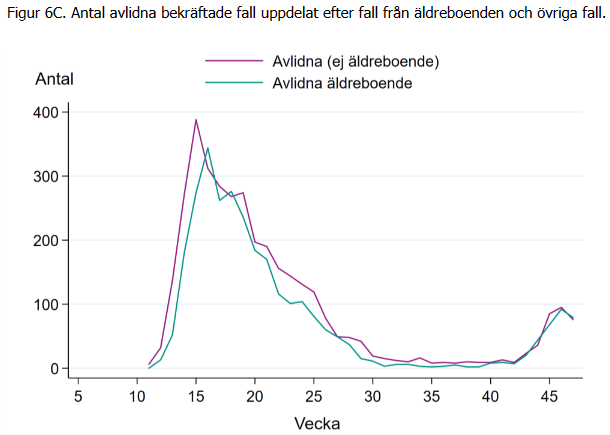
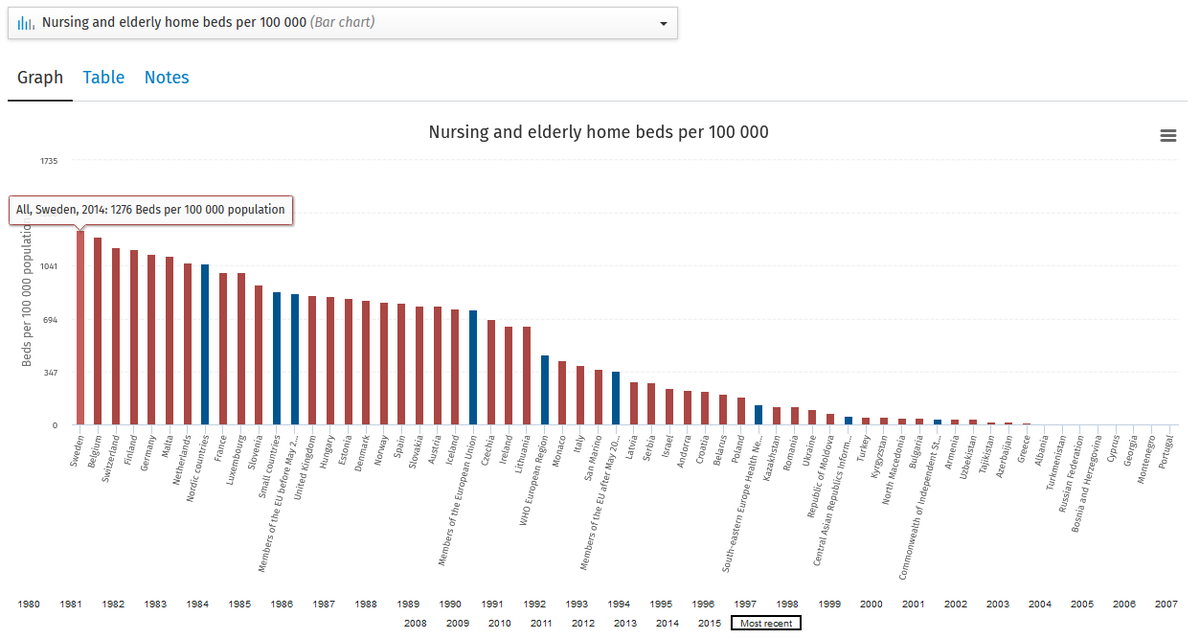
5/n Exess mortality ("overdödlighet") during the 2nd wave in Sweden was LOWER than deaths with confirmed ("bekräftade") Covid19.
During the 1st wave it was slightly HIGHER. Some Covid19 deaths have a different cause ("dödsorak") of death folkhalsomyndigheten.se/globalassets/s…
During the 1st wave it was slightly HIGHER. Some Covid19 deaths have a different cause ("dödsorak") of death folkhalsomyndigheten.se/globalassets/s…
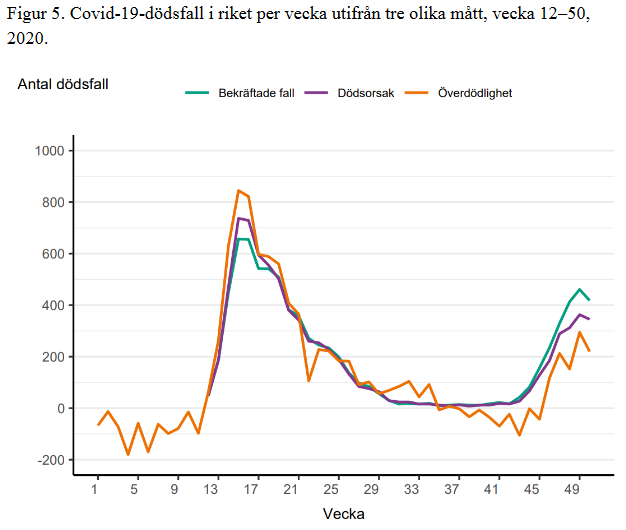
6/n
Raw case and death data for Swedish elderly care settings is published continuously @LTCcovid
More cases ("labor...") and deaths ("avlidna") in institutional care ("särskilt") although much fewer people than at home care ("hemtjänst").
socialstyrelsen.se/statistik-och-…

Raw case and death data for Swedish elderly care settings is published continuously @LTCcovid
More cases ("labor...") and deaths ("avlidna") in institutional care ("särskilt") although much fewer people than at home care ("hemtjänst").
socialstyrelsen.se/statistik-och-…
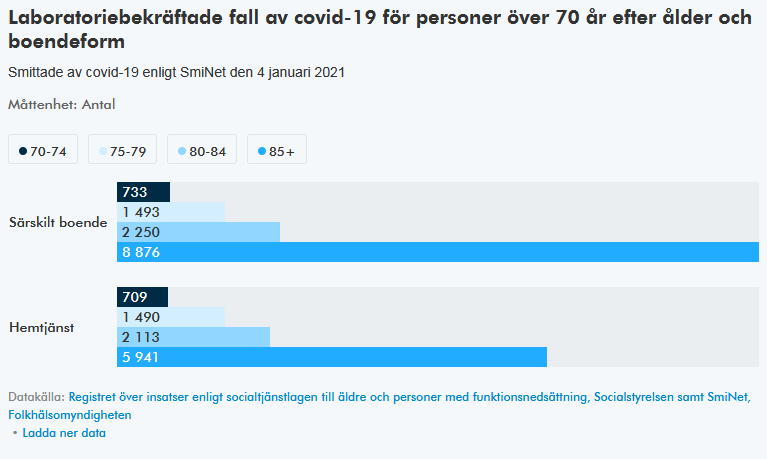
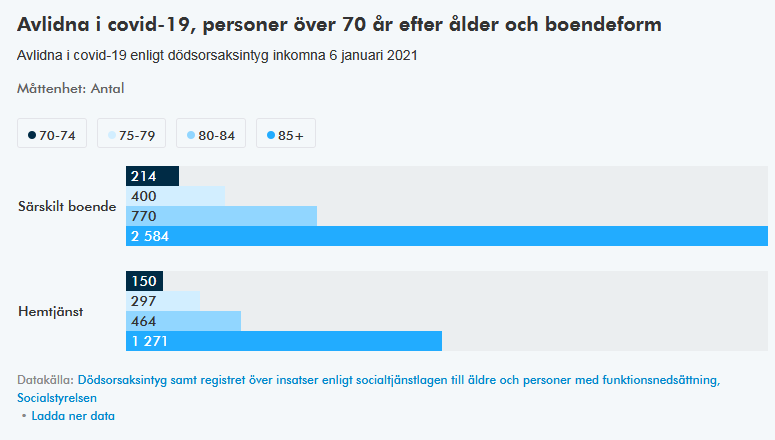
7/n
Frailty has been identified as a better predictor of Covid19 hospitalization outcomes than comorbidities and age.
thelancet.com/journals/lanpu…
Frailty has been identified as a better predictor of Covid19 hospitalization outcomes than comorbidities and age.
thelancet.com/journals/lanpu…
8/n
Seroprevalence (per capita infection rates) in nursing homes is likely much higher than in age peers who live at home. But infection fatalities rates (IFR = individual outcome risk) are also much higher.
Seroprevalence (per capita infection rates) in nursing homes is likely much higher than in age peers who live at home. But infection fatalities rates (IFR = individual outcome risk) are also much higher.
https://twitter.com/CoronaReduit/status/1336322929231945729
9/n
Per capita cases are lower in seniors than working age EXCEPT for the age group with many people who need elderly care: 80+. this is the same all over Europe. Mild/partial lockdowns do NOT solve that problem as illustrated by Germany this fall. Cases kept rising in 80+.
Per capita cases are lower in seniors than working age EXCEPT for the age group with many people who need elderly care: 80+. this is the same all over Europe. Mild/partial lockdowns do NOT solve that problem as illustrated by Germany this fall. Cases kept rising in 80+.
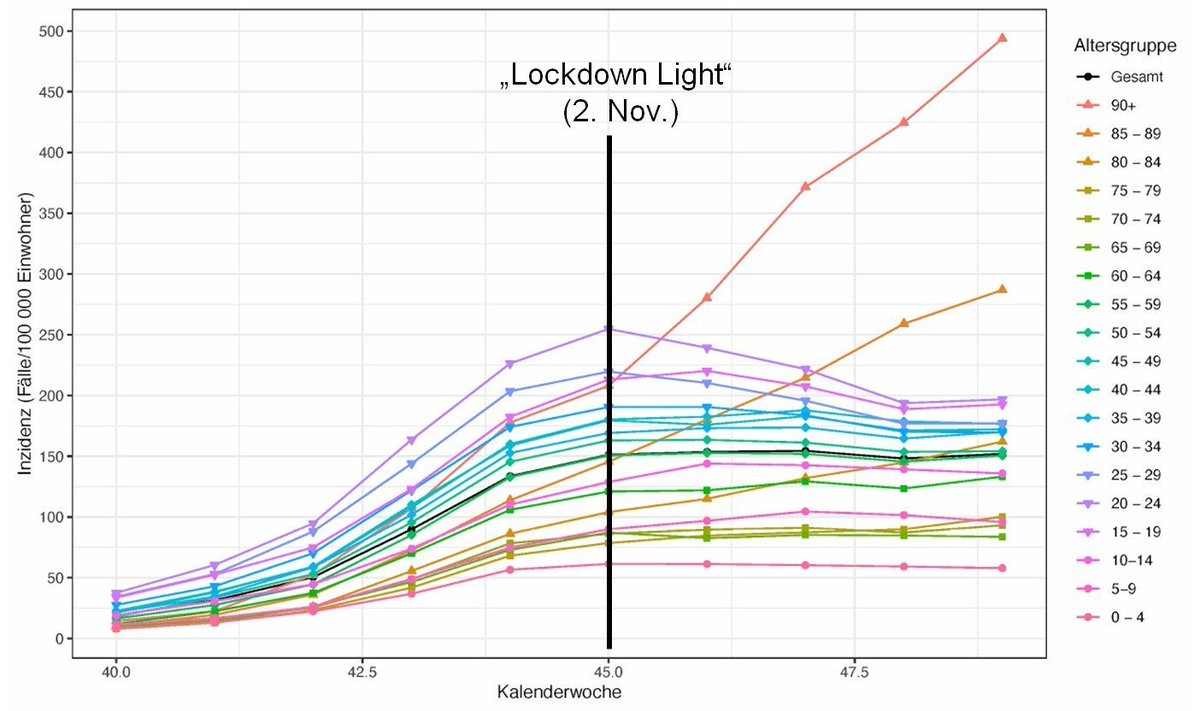
10/n other countries have similar patterns with >50% of C19 deaths in nursing homes and another signifcant share in at home elderly care. more data and analysis can be found in this thread:
https://twitter.com/CoronaReduit/status/1336322824152104960
11/n
Cumulative Swiss excess mortality in 2020 was almost exclusively in 80+ years (85%). Total: 6'509.
Data is not population growth adjusted, so it is OVERstated.
If >50% of Covid19 deaths are from nursing homes, excess mortality among non-residents is low in CH as well

Cumulative Swiss excess mortality in 2020 was almost exclusively in 80+ years (85%). Total: 6'509.
Data is not population growth adjusted, so it is OVERstated.
If >50% of Covid19 deaths are from nursing homes, excess mortality among non-residents is low in CH as well
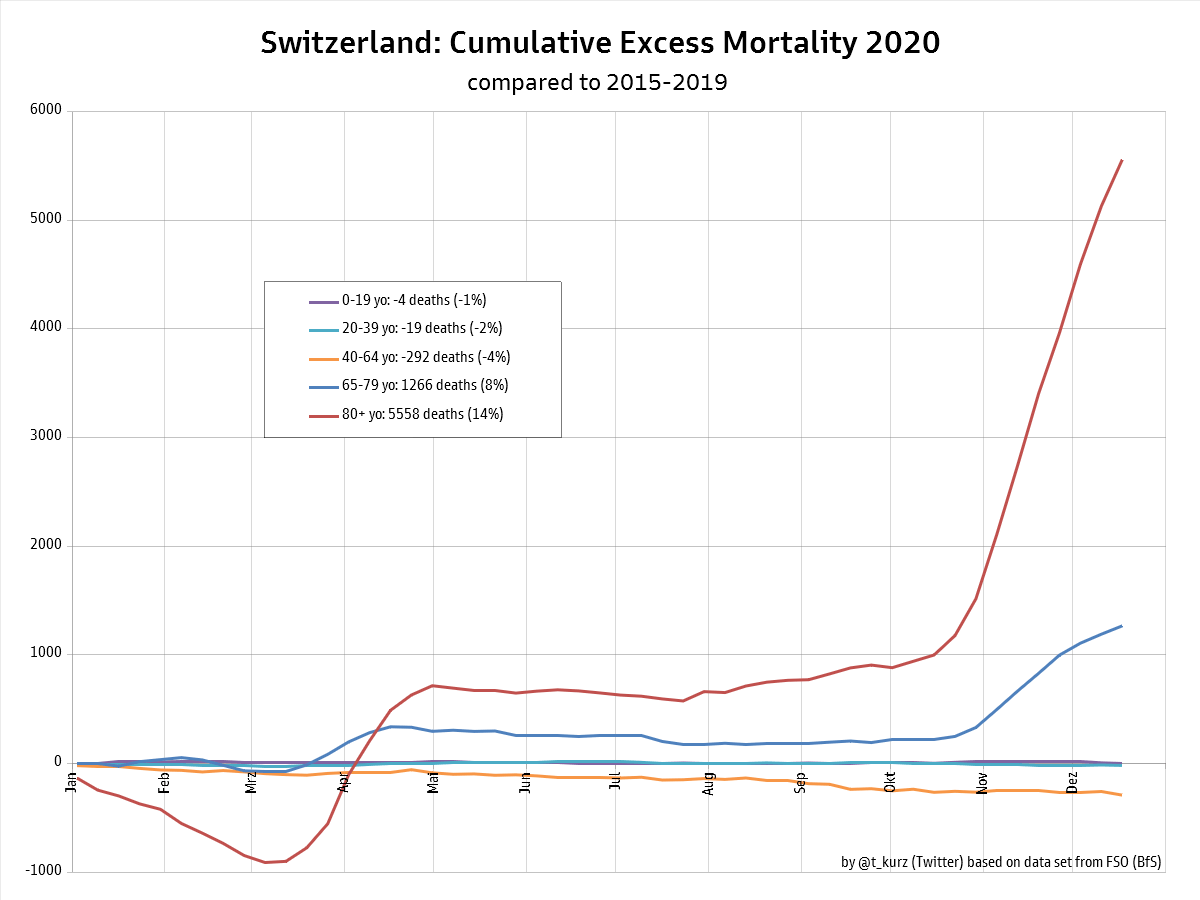
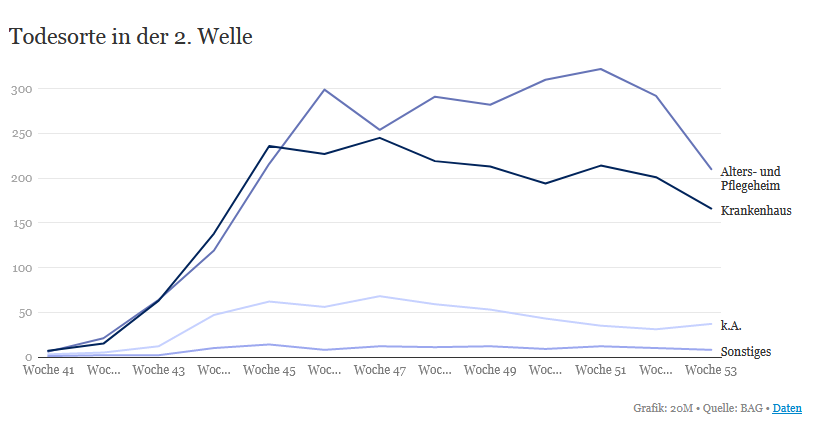
12/n 2020 excess mortality in Ticino nursing homes in months with Covid19 is also +~100% confirming the Swedish trend.
also notable: SUBmortality after spring wave in May and June.
www4.ti.ch/fileadmin/DSS/…
also notable: SUBmortality after spring wave in May and June.
www4.ti.ch/fileadmin/DSS/…
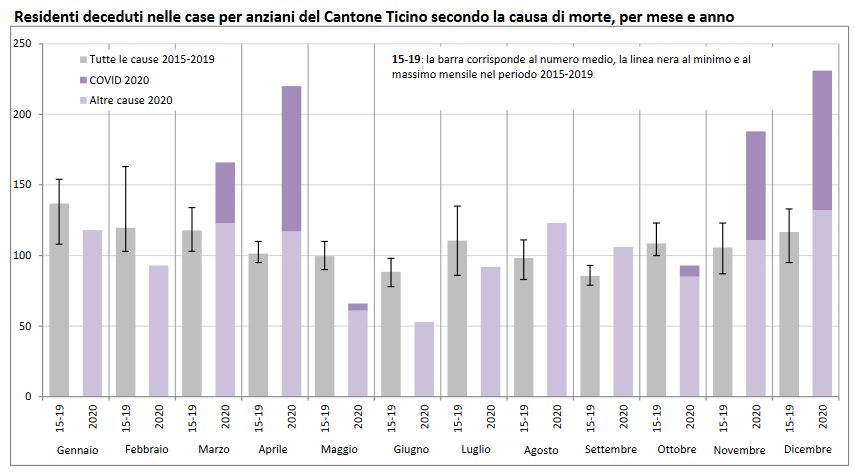
13/n Geneva had 84.7% of it's Covid19 deaths in some kind of elderly care. Consequently the burden of excess mortality is almost EXCLUSIVELY in elderly care.
details in this thread
details in this thread
https://twitter.com/CoronaReduit/status/1348607402506121216
14/n
Conclusion: SARSCoV2 infection risk AND Covid19 outcome risk have LONG TAIL DISTRIBUTIONS and are correlated with frailty
1. Frailty requires elderly care, putting persons at higher (nosocomial) infection risk.
2. Frailty weakens the immune system increasing outcome risk.
Conclusion: SARSCoV2 infection risk AND Covid19 outcome risk have LONG TAIL DISTRIBUTIONS and are correlated with frailty
1. Frailty requires elderly care, putting persons at higher (nosocomial) infection risk.
2. Frailty weakens the immune system increasing outcome risk.
15/n
age specific models @keiserolivia @C_Althaus and antibody studies @silviast9 need to look at the special groups mentioned above in this thread:
1. nursing home residents
2. at home care recipients
Otherwise results are INACCURATE in seroprevalence, IFR, deaths, years lost.
age specific models @keiserolivia @C_Althaus and antibody studies @silviast9 need to look at the special groups mentioned above in this thread:
1. nursing home residents
2. at home care recipients
Otherwise results are INACCURATE in seroprevalence, IFR, deaths, years lost.
• • •
Missing some Tweet in this thread? You can try to
force a refresh









